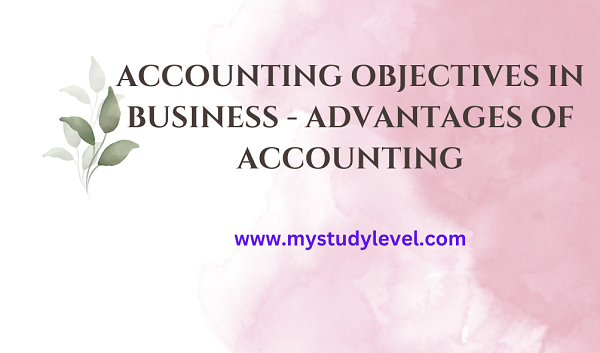Accounting Objectives in Business, information about the above matters helps the proprietor in assuring that the funds of the business are not unnecessarily kept idle or under-utilized.
Accounting Objectives in Business – Advantages of Accounting
The following are the main objectives of accounting:
- To keep systematic records: Accounting is done to keep a systematic record of financial transactions. In the absence of accounting, there would have been terrific burden on human memory, which in most cases would have been impossible to bear.
- To protect business properties: Accounting provides protection to business properties justified and unwarranted use. This is possible on account of accounting, supplying the following information to the manager or the proprietor :
- The amount of the proprietor’s funds invested in the business.
- How much the business has to pay to others?
- How much the business has to recover from others?
- How much the business has in the form of (a) fixed assets, (b) cash in hand, (c) cash at bank, (d) stock of raw materials, work-in-progress and finished goods?
Information about the above matters helps the proprietor in assuring that the funds of the business are not unnecessarily kept idle or under-utilized.
- To Ascertain the Operational Profit or Loss: Accounting helps in ascertaining the net profit earned or loss suffered on account of carrying the business. This is done by keeping proper record of the revenues and expenses of a particular period. The profit and loss account is prepared at the end of a period and if the amount of revenue for the period is more than the expenditure incurred in earning that revenue, there is said to be a profit. In case the expenditure exceeds the revenue, there is said to be a loss.
Profit and loss account will help the management, investors, creditors etc. in knowing whether running of the business has proved to be remunerative or not. In case, it has not proved to be remunerative or profitable, the cause of such a state of affairs is investigated and necessary medial steps are taken.
- To ascertain the financial position of business: The profit and loss account gives the amount of profit or loss made by the business during a particular period. However, it is not enough. The businessman must know about his financial position i.e., where he stands; what he owes and what he owns? This objective is served by the balance sheet or position statement. The balance sheet is a statement of assets and liabilities of the business on a particular date. It serves as barometer for ascertaining the financial health of the business.
5. To Facilitate Rational Decision Making: Accounting these days has taken upon itself the task of collection, analysis and reporting of information at the required points of time to the required levels of authority, in order to facilitate rational decision making.
The American Accounting Association has also stressed this point while defining the term ‘accounting’ when it says that accounting is, “the process of identifying, measuring and communicating economic information to permit informed judgement and decisions by users of the information.” Of course this is by no means an easy task.
However, the accounting bodies all over the world an. Particularly the International Accounting Standards Committee (now Board), have been trying to grapple with this problem and have achieved success in laying down some basic postulates, sum the basis of which the accounting statements have to be prepared. These postulates have bee explained in the next chapter.
Advantages of Accounting
Accounting is useful in the following respects :
“A good system of accounting is a storehouse of valuable information.” Welsch and Anthon Accounting is useful in a number of ways.
Brief account of its uses and advantages is given below :
- Replacement of Memory. Human memory has a limited capacity to store every business transaction in mind. Therefore, the need arises to record every transaction in different books account. Accounting helps in keeping a systematic and permanent record of business, which make be referred from time to time.
- Helpful in tax assessment. In most of the eases, the business is required to pay income tax, value added tax, excise duty, etc., to the government. The fixation of tax liability is done a the basis of account books, provided these are prepared according to the requirement of law. the absence of proper record of business, the concerned tax authorities may do tax assessment according to their own judgement.
- Prevents frauds. The maintenance of proper account books prevents irregularities appropriations, frauds, errors, etc. A dishonest employee will hardly get opportunity mainly commit fraud in respect of cash, goods, etc., if the books are systematically maintained. If at almost some errors, frauds, etc. have taken place, the possibility of their detection is very high, where l proper books are kept.
- Business valuation. If a running business is to be sold or purchased, it is essential Homepage ascertain the value of business. Accounting helps in the calculation of this amount.
- Helps in debt collection. When the goods are sold on credit, the account of the customer time it is opened in the books. Proper recording helps to know how much goods have been sold on credament. I to various customers, how much is the cash received from them and finally, how much is jumgle, ima from them. A systematic record enables to send periodic account statement to the customers wha t are the debtors of the business. Reminders of payment may also be sent to the defaulter, who a m esc irregular in making payment of their debts.
- Helpful in planning. An efficient management always plans for the future targets, whilpon will be the plan for production, purchase of goods, sales, marketing of goods, advertise mentation’s acquisition of fixed assets, funds, etc. in the next accounting period. All this has to be planned i a systematic manner. Without adequate accounting data, it is not possible to make effectivmilgas, ch planning.












Leave a Reply